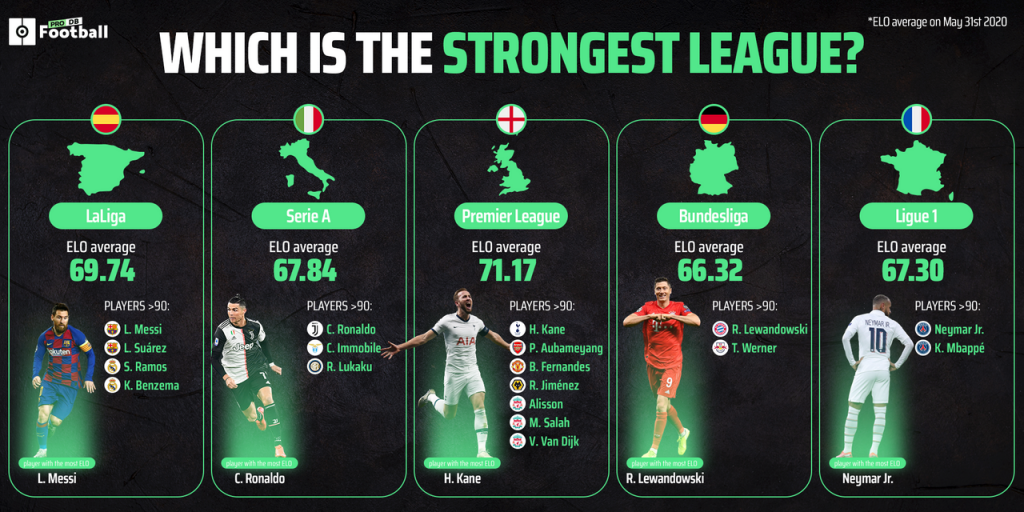
Navigating the Minefield: UCL Fantasy Players to Avoid for a Winning Strategy
The UEFA Champions League Fantasy game is a thrilling rollercoaster, offering managers the chance to pit their strategic prowess against the best footballing minds – or at least, against their friends. With elite talent gracing the pitch every matchday, it’s easy to get carried away by the allure of marquee names and their seemingly limitless point potential. However, a truly successful UCL Fantasy campaign isn’t just about picking the right stars; it’s equally, if not more, about skillfully navigating the minefield of players who, despite their real-world brilliance, can become fantasy black holes.
Avoiding these pitfalls is crucial for budget management, maximizing points, and minimizing frustrating blank gameweeks. This article delves deep into the categories of UCL players you should approach with extreme caution, if not outright steer clear of, to ensure your fantasy journey is one of triumph, not despair.
1. The Overpriced Underperformer: The Allure of the Big Name
Every season, certain players command exorbitant prices in UCL Fantasy purely based on their reputation. These are often household names, Ballon d’Or contenders, or players from dominant clubs. While their talent is undeniable, their fantasy output might not justify their premium cost.
Why to Avoid:
- Inflated Price Tag: Their price eats up a significant chunk of your budget, limiting your ability to spread quality across your squad.
- Inconsistent Returns: Despite their quality, they might not consistently deliver fantasy points due to various factors like role changes, team tactics, or simply an off-season.
- High Opportunity Cost: The points you don’t get from them could have been earned by two or three cheaper, more consistent players.
Common Scenarios/Examples:
- Aging Superstars: Players past their absolute prime who might still command high fees but aren’t as explosive or prolific as they once were. Think of a striker who’s now more involved in link-up play than pure goalscoring, or a defender whose clean sheet potential is declining with age.
- Star Players in Transition: A player who has recently moved clubs and is still adapting to a new system, or one whose team is undergoing a rebuild. Their individual brilliance might still shine occasionally, but consistency could be an issue.
- Midfielders Lacking Goal Threat: Elite central midfielders who dictate play but rarely get into goal-scoring positions or provide assists. While crucial in real football, their fantasy returns are often limited to dribbles, passes, and perhaps an occasional tackle, which don’t yield many points.
Strategy: Don’t pick a player solely based on their name. Always cross-reference their price with their recent fantasy point history and their expected role. Look for value elsewhere.
2. The Injury-Prone Enigma: The Perennial Hospital Pass
Nothing saps the joy out of UCL Fantasy faster than seeing a key player sidelined with an injury. While injuries are an unavoidable part of football, some players have a well-documented history of spending more time in the treatment room than on the pitch.
Why to Avoid:
- Unpredictability: You never know when they’ll pick up their next knock, leading to frustrating last-minute transfers or wasted substitutions.
- Wasted Budget: You’re paying a premium for a player who isn’t consistently available to score points.
- Transfer Penalties: Constantly having to transfer out injured players leads to valuable points deductions.
Common Scenarios/Examples:
- Players with Chronic Issues: Those who suffer from recurring muscle strains, joint problems, or other long-term ailments. Their presence in the starting XI is always a gamble.
- Players Returning from Long-Term Layoffs: While tempting, a player just returning from a serious injury might not immediately hit peak form, or could be eased back into action with limited minutes, increasing their rotation risk.
- Players with a “Glass” Reputation: Even if they’re currently fit, their past record of frequent injuries should make you think twice.
Strategy: Research player injury histories. Websites and news sources often provide detailed reports. If a player has a long rap sheet of injuries, consider alternatives, even if they’re slightly less glamorous.
3. The Rotation Roulette: The Manager’s Secret Weapon (Against You)
Top clubs competing on multiple fronts (domestic league, cup competitions, Champions League) often employ squad rotation to keep players fresh and manage fatigue. While beneficial for the team, it’s a nightmare for fantasy managers.
Why to Avoid:
- Uncertainty: You can never be sure if your chosen player will start, come off the bench, or be rested entirely.
- Blank Gameweeks: A player sitting on the bench yields zero points, effectively giving you a blank gameweek for that slot.
- Bench Woes: If your rotational player doesn’t start, you rely on your bench to step in, which might not always be strong enough.
Common Scenarios/Examples:
- Players in Heavily Stocked Squads: Teams like Manchester City, Real Madrid, or PSG often have multiple world-class options for each position. Midfielders and attackers, in particular, are prone to rotation.
- Players with Direct Competition: If a player has a highly competent backup, or is part of a constantly changing attacking trident, their minutes are not guaranteed.
- Youngsters or Fringe Players: While tempting as budget enablers, these players are often the first to be rested or dropped when the fixtures pile up.
Strategy: Monitor team news, press conferences, and previous line-ups. Look for players who are “undroppable” for their teams due to their unique skill set or lack of direct competition. Be wary of players from teams known for heavy rotation, especially in the early group stages where teams might experiment.
4. The Form Fluctuation Fiasco: The Cold Streak Conundrum
Footballers, like all athletes, go through periods of varying form. A player who was red-hot last season might be struggling this year, or vice-versa. Relying on past glory without assessing current performance is a common fantasy mistake.
Why to Avoid:
- Misleading Statistics: A player’s career statistics might look impressive, but their recent form could be abysmal.
- Lack of Confidence: Players lacking confidence are less likely to take risks, make decisive passes, or attempt shots, all of which translate to fewer fantasy points.
- Tactical Changes: A team’s tactical shift could render a previously productive player less effective in a fantasy context.
Common Scenarios/Examples:
- Strikers in a Goal Drought: A forward who hasn’t scored in several games, even if their team is winning, might be worth avoiding until they regain their scoring touch.
- Defenders from Leaky Defenses: A top defender from a team that is consistently conceding goals is unlikely to keep clean sheets, significantly reducing their fantasy appeal.
- Midfielders Not Getting Assists/Goals: Playmaking midfielders who are not translating their passes into key passes or assists are fantasy deadwood.
Strategy: Always check recent form. Look beyond just goals and assists; consider underlying stats like shots on target, key passes, and defensive actions. Don’t be afraid to drop a high-profile player who is consistently underperforming.
5. The Fixture Nightmare: The Road to Oblivion
The Champions League group stage draws can be brutal. A team facing a “group of death” will have a significantly tougher path to points than one with a relatively easy draw. Players from teams with consistently difficult fixtures are often worth avoiding.
Why to Avoid:
- Reduced Clean Sheet Potential: Defenders and goalkeepers from teams facing strong attacking opponents are less likely to keep clean sheets.
- Limited Goal/Assist Opportunities: Attackers from teams that are constantly on the back foot against superior opposition will have fewer chances to score or assist.
- Negative Goal Difference: Heavy losses can negatively impact goal difference, which could be a tie-breaker, indirectly reflecting on player morale and future performance.
Common Scenarios/Examples:
- Players from Underdog Teams in Tough Groups: A star player from a smaller league team drawn against three European giants is unlikely to consistently deliver points. While they might pull off an upset, the risk is too high.
- Defenders Facing Top Attackers: Picking a defender from a mid-tier team when they are scheduled to play against Real Madrid, Manchester City, and Bayern Munich in consecutive gameweeks is a recipe for disaster.
Strategy: Always consider the fixture list for the next few gameweeks. Plan your transfers to take advantage of favorable matchups and avoid difficult ones. Sometimes, it’s better to bench a good player with a terrible fixture than to play them.
6. The Role Reversal Ramifications: When Position Changes Impact Points
Sometimes, a manager might deploy a player in a different role or position than their traditional one. While this can sometimes unlock new potential, it often has negative implications for fantasy points.
Why to Avoid:
- Reduced Attacking Output: A forward deployed as a defensive midfielder, or a winger playing as a full-back, will naturally have fewer opportunities for goals and assists.
- Changed Point Scoring Avenues: A player known for clean sheets might now be in a more attacking role where clean sheets are less relevant, or vice versa.
- Unfamiliarity with Role: A player might struggle to adapt to a new position, leading to poorer individual performance.
Common Scenarios/Examples:
- Attacking Players Dropping Deep: A striker who is now playing as a false nine or deeper playmaker, focusing more on link-up play than direct goal threat.
- Wingers Converted to Full-Backs: While they might still offer some attacking threat, their primary role shifts to defense, reducing their clean sheet potential and direct goal contributions.
- Defensive Midfielders in Central Defense: A holding midfielder filling in at center-back might lose their bonus points for tackles and interceptions if their new role is more about static defending.
Strategy: Pay close attention to team sheets and tactical analyses. If a player’s role has significantly changed, reassess their fantasy value based on their new responsibilities and expected point-scoring avenues.
Conclusion: The Art of Smart Avoidance
Mastering UCL Fantasy is not just about identifying the next big thing; it’s about shrewdly avoiding the traps that can derail your season. By understanding the categories of players to approach with caution – the overpriced underperformers, the injury-prone enigmas, the rotation risks, the cold streaks, the fixture nightmares, and the role-changed liabilities – you equip yourself with the knowledge to make informed decisions.
Remember, every decision in fantasy football is a balance of risk and reward. While some high-risk players might occasionally pay off, consistently avoiding the common pitfalls will provide a more stable foundation for your team, preserve your budget, and ultimately, lead to a more enjoyable and successful Champions League Fantasy campaign. Do your research, stay updated with team news, trust your instincts, and don’t be swayed by hype alone. Good luck, manager!



